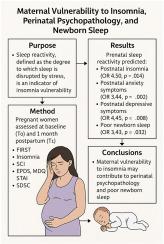产妇易失眠症:与新生儿睡眠不良和围产期精神病理的关系
IF 3.4
2区 医学
Q1 CLINICAL NEUROLOGY
引用次数: 0
摘要
睡眠反应性被定义为由于压力而导致睡眠中断的程度,是一种独特的特征,也是一个人易患失眠症的指标。虽然失眠可能是产妇精神病理的危险因素,但我们旨在研究产妇失眠易感性及其与围产期精神病理和新生儿睡眠的关系。方法在意大利费拉拉和乌迪内大学医院妇科住院分娩前的最后一次常规评估中招募孕妇。评估包括基线评估(T0)和产后1个月(T1)的失眠症脆弱性评估,包括福特失眠压力反应测试(FIRST)、睡眠状况指标失眠障碍(SCI)、情绪和焦虑症状(爱丁堡产后抑郁量表(EPDS)、情绪障碍问卷(MDQ)、状态-特质焦虑量表(STAI)和儿童新生儿睡眠障碍量表(SDSC)。结果2010年共纳入151例孕妇。在10点时,睡眠反应性升高影响了36.4%的人。产前睡眠反应性升高的妇女更容易受到产前、失眠、焦虑和情绪症状的影响。产前睡眠反应性升高预测产后失眠(OR 4.50,p = 0.014)、焦虑(OR 3.44, p = 0.002)和抑郁症状(OR。4.45, p = 0.008),预测新生儿睡眠不良(OR 3.43, p = 0.032)。结论产妇易失眠症是导致新生儿并发及产后精神病理和新生儿睡眠不良的重要产前因素。研究结果可能表明,患有失眠症且睡眠反应性升高的女性所生的新生儿失眠有潜在的遗传因素。本文章由计算机程序翻译,如有差异,请以英文原文为准。

Maternal vulnerability to insomnia: Relationship with poor newborn sleep and peripartum psychopathology
Purpose
Sleep reactivity, defined as the degree to which sleep is disrupted due to exposure to stress, serves as a distinctive trait and an indicator of an individual's vulnerability to insomnia. While insomnia may be a risk factor for maternal psychopathology, we aimed to study maternal insomnia vulnerability and its relationship with perinatal psychopathology and newborn sleep.
Method
Pregnant women were recruited during their last routine assessment before being hospitalized for delivery at the Gynecological Unit of the University Hospital of Ferrara and Udine, Italy. The assessment included baseline evaluation (T0), and evaluations at 1 months (T1) in the postpartum period with specific questionnaires for insomnia vulnerability such as the Ford Insomnia Response to Stress Test (FIRST), Insomnia Disorder such as Sleep Condition Indicator (SCI), mood and anxiety symptoms such as Edinburgh Postnatal Depression Scale (EPDS), Mood Disorder Questionnaire (MDQ), State-Trait Anxiety Inventory (STAI) and newborn sleep Disturbance Scale for Children (SDSC).
Results
At T0, 151 pregnant women were included. Elevated sleep reactivity affected the 36.4 % at T0. Women with elevated prenatal sleep-reactivity were significantly more affected by prenatal, insomnia, anxiety and mood symptoms. Prenatal elevated sleep reactivity predicted post natal insomnia (OR 4.50,p = 0.014), anxiety (OR 3.44, p = 0.002) and depressive symptoms (OR. 4.45, p = 0.008), It also predicted poor newborn sleep (OR 3.43, p = 0.032).
Conclusions
Maternal vulnerability to insomnia is an important prenatal factor that may contribute to concurrent and postpartum psychopathology and to poor newborn sleep. Findings may suggest a potential hereditary aspect of insomnia in newborns born to women with insomnia disorder and exhibiting elevated sleep reactivity.
求助全文
通过发布文献求助,成功后即可免费获取论文全文。
去求助
来源期刊

Sleep medicine
医学-临床神经学
CiteScore
8.40
自引率
6.20%
发文量
1060
审稿时长
49 days
期刊介绍:
Sleep Medicine aims to be a journal no one involved in clinical sleep medicine can do without.
A journal primarily focussing on the human aspects of sleep, integrating the various disciplines that are involved in sleep medicine: neurology, clinical neurophysiology, internal medicine (particularly pulmonology and cardiology), psychology, psychiatry, sleep technology, pediatrics, neurosurgery, otorhinolaryngology, and dentistry.
The journal publishes the following types of articles: Reviews (also intended as a way to bridge the gap between basic sleep research and clinical relevance); Original Research Articles; Full-length articles; Brief communications; Controversies; Case reports; Letters to the Editor; Journal search and commentaries; Book reviews; Meeting announcements; Listing of relevant organisations plus web sites.
 求助内容:
求助内容: 应助结果提醒方式:
应助结果提醒方式:


